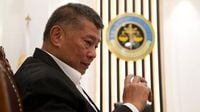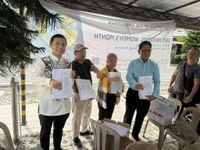On September 15, 2025, a political storm erupted in the Philippines as Acting Davao City Mayor Sebastian "Baste" Duterte filed sweeping criminal and administrative complaints against a host of high-ranking government officials. The move, which has sent shockwaves through the country’s political and legal circles, centers on the dramatic arrest and transfer of former President Rodrigo Duterte to the International Criminal Court (ICC) in March—a saga that has polarized the nation and reignited fierce debate over sovereignty, justice, and the rule of law.
The 160-page affidavit-complaint, prepared by a legal team led by Atty. Israelito Torreon and filed at 8:55 AM before the Office of the Ombudsman for Mindanao in Davao City, names a veritable who’s-who of the current administration. Among the respondents: Interior and Local Government Secretary Juan Victor “Jonvic” Remulla, Defense Secretary Gilbert Teodoro, National Security Adviser Eduardo Año, Justice Secretary Jesus Crispin “Boying” Remulla, former Philippine National Police (PNP) chiefs Rommel Francisco Marbil and Nicolas Torre III, former PNP spokesperson Brigadier General Jean Fajardo, Justice Undersecretary Nicholas Felix Ty, Ambassador Markus V. Lacanilao, Executive Director Anthony D. Alcantara, and Prosecutor General Richard Anthony Fadullon.
According to Mindanews and Daily Tribune, the complaint stems from the events of March 11, 2025, when former President Duterte, accompanied by his partner Honeylet Avanceña and daughter Veronica, arrived at Ninoy Aquino International Airport Terminal 3 from Hong Kong. There, police and government authorities allegedly approached the Duterte entourage without presenting a Philippine court-issued arrest warrant. Instead, they reportedly displayed an Interpol document tied to ICC proceedings—a paper Mayor Duterte’s camp argues has no legal force within the country.
What followed, according to the affidavit, was a tense and chaotic sequence. Former President Duterte and his party were whisked away to Villamor Airbase in Pasay City, where they were held in a guarded holding room for several hours. During this time, they were denied access to medical care and legal counsel, despite the former president’s well-documented battle with diabetes. The complaint includes a photo of a physician examining Duterte at Villamor, recording a blood glucose reading of 328 mg/dL, and recommending urgent hospital admission—a recommendation that was allegedly ignored.
The drama escalated when Vice President Sara Duterte, acting as her father’s lawyer, was repeatedly denied entry at the Villamor gate to see him or obtain legal documents. Adding to the spectacle, former Executive Secretary Salvador Medialdea was reportedly handcuffed and separately arrested. The group was then placed on a chartered Gulfstream G550 flight to The Hague, Netherlands, via Dubai, all without a domestic court order or any extradition proceedings, as detailed by Mindanews.
Upon arrival in the Netherlands on March 12, former President Duterte appeared—represented by Medialdea—in an ICC initial hearing on March 14. The ICC’s Pre-Trial Chamber I, in a statement cited by Mindanews, found "reasonable grounds to believe that the former President, jointly with and through other persons, agreed ‘to kill individuals they identified as suspected criminals or persons having criminal propensities, including but not limited to drug offenders, initially in Davao and subsequently throughout the country.’" The Chamber concluded that this amounted to "an attack directed against a civilian population under an organizational policy while Duterte was the head of the Davao Death Squad (DDS), and under a State policy while he was the President of the Philippines."
Mayor Duterte’s complaint is comprehensive and forceful. The charges include eight counts each of kidnapping and arbitrary detention, violations of the Anti-Torture Act (RA 9745), qualified direct assault, expulsion, violations of RA 7438 (rights of persons under custodial investigation), usurpation of judicial functions, and multiple counts under the Anti-Graft and Corrupt Practices Act (RA 3019). On the administrative side, the complaint accuses the respondents of serious dishonesty, gross neglect of duty, grave misconduct, disloyalty to the Republic and the Filipino people, grave abuse of authority, and conduct prejudicial to the best interest of the service.
In the affidavit, Mayor Duterte insists, "He was arrested without grounds and his arrest was not made with the proper procedure established by the law and the rules." He further contends, "Enforcing and cooperating with the ICC post-withdrawal will violate the very independence of our country and its sovereign existence…There is nothing to cooperate, but the respondents still chose to, despite our vehement oppositions." According to Daily Tribune, he also argued that the ICC has no jurisdiction over the case, citing the Philippines’ withdrawal from the Rome Statute in 2019—"the warrant was invalid as it was illegally issued through Interpol by the ICC, which no longer has jurisdiction over the Philippines as early as March 2019."
The ICC, however, maintains its authority over crimes allegedly committed before the country’s withdrawal, emphasizing that its preliminary investigation was already underway prior to the exit. This legal gray area is at the heart of the current controversy, with both sides digging in for what promises to be a protracted battle.
Notably, the new complaint comes on the heels of the Ombudsman’s dismissal of a similar case filed by Senator Imee Marcos in May. While that decision could have cleared the way for Justice Secretary Remulla’s bid to become the next Ombudsman—since the Judicial and Bar Council (JBC) disqualifies applicants with pending criminal or administrative complaints—the latest filing by Mayor Duterte has thrown a wrench into those plans. As Daily Tribune points out, "The dismissal of Senator Marcos’ complaint could have paved the way for the production of the clearance for Justice Secretary Remulla, but this latest complaint by Mayor Duterte made it unattainable."
Mayor Duterte is also seeking preventive suspension of the respondents, arguing that "evidence of guilt is strong" and that their continued tenure could jeopardize witnesses and evidence. He has filed a separate petition for a Writ of Habeas Corpus before the Supreme Court concerning his father’s alleged detention and expulsion.
The Ombudsman’s office has yet to rule on the complaint’s sufficiency or order any action as of this writing. Should it find sufficient basis, it may initiate a preliminary investigation and impose preventive suspension during the proceedings, as expressly sought by the complainant.
This unfolding legal drama is more than a clash of legal interpretations—it’s a test of the Philippine justice system’s independence and resilience. For supporters of the former president, the arrest and transfer to the ICC is seen as a violation of sovereignty and due process. For others, it is a long-overdue reckoning for alleged abuses committed during Duterte’s controversial war on drugs. The international community, meanwhile, is watching closely, as the outcome could set a precedent for how states navigate the tension between domestic law and international accountability.
As the case moves forward, the nation waits—for answers, for justice, and for clarity on where the boundaries of law and power truly lie in the Philippines.


